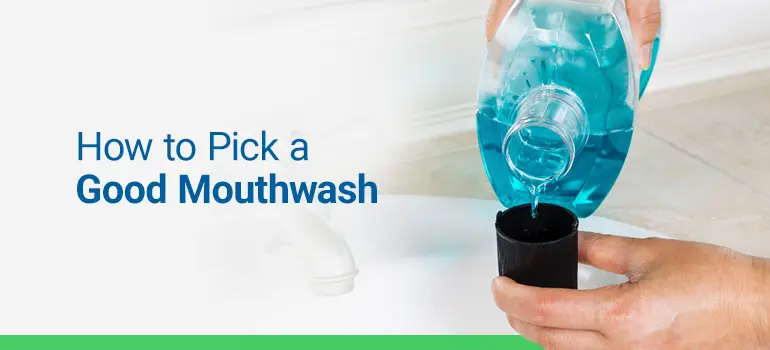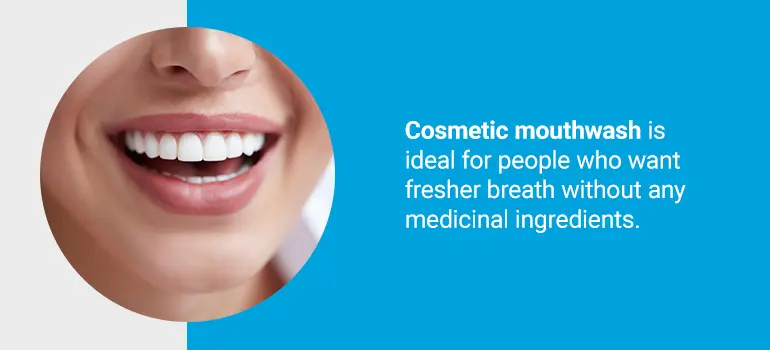
When you enter the mouthwash aisle, you may feel overwhelmed by all of the different options. There are countless brands and formulas to choose from, each claiming unique benefits for your oral health. Some advertise fresh breath, while others offer protection from cavities. Which one should you choose?
Picking a good mouthwash depends on your specific dental needs. Finding the right one can help boost your daily oral care routine. This guide will explain how to pick a good mouthwash that works for you.
Does It Matter What Mouthwash I Use?
When it comes to your oral health, brushing and flossing make the most significant impact. Using mouthwash is like a bonus to give your oral care routine an extra boost. You can use mouthwash to help neutralize bad breath or whiten your smile. While mouthwash isn’t a necessity, it’s useful and effective at promoting the health of your gums and teeth. Any mouthwash will benefit your oral health, but choosing the right kind can provide the specific benefits that you want most.
Types of Mouthwash
Not all mouthwashes are the same. They contain various ingredients to achieve a wide range of benefits. Here are the most common formulas to help you choose which mouthwash to use:
1. Fluoride
Sodium fluoride is the active ingredient in fluoride mouthwash. If you get frequent cavities, it can help strengthen your enamel and protect your teeth from decay. When used as advised, it’s beneficial for children and adults. Fluoride is a common ingredient in toothpaste and tap water, but consuming an excessive amount can cause health issues. Check with your dentist before adding fluoride mouthwash to your oral care routine to ensure you’re not ingesting too much.
2. Antiseptic
The term antiseptic describes substances that eliminate microorganisms. Antiseptic mouthwash usually contains alcohol that kills bad breath and infection-causing bacteria. This type of mouthwash is the most common amongst consumers. When combined with regular brushing and flossing, antiseptic mouthwash is effective at preventing gingivitis and cavities. People who experience dry mouth should avoid using alcohol-based mouthwash, as it may increase their symptoms. Some antiseptic mouthwashes also contain active ingredients that may cause tooth discoloration. If you experience brown staining from using an antiseptic mouthwash, you can use whitening treatments to remove it.
3. Sensitivity
Mouthwash for tooth sensitivity contains active ingredients that coat the nerves to prevent stimuli from causing pain and discomfort. Some formulas also contain ingredients that numb or desensitize your teeth. This mouthwash is intended to treat low levels of sensitivity. If you experience intense pain when consuming hot, cold, or sugary foods or beverages, you should visit the dentist to check for serious oral health conditions.
4. Cosmetic
Cosmetic mouthwash has one purpose — to temporarily control bad breath. While it doesn’t protect against gum disease or tooth decay, it’s ideal for people who want fresher breath without any medicinal ingredients. Cosmetic mouthwash is safe to use as frequently as you want, in addition to consistent brushing and flossing.

5. All-Natural
All-natural mouthwash offers the same benefits as a traditional mouthwash but with natural ingredients that some people feel more comfortable using. Natural formulas can promote healthy gums, fight gingivitis, kill bacteria, and freshen your breath. Some people believe natural mouthwash is safer than products that contain chemicals and alcohol.
6. Whitening
If you enjoy having pearly white teeth, whitening mouthwash can help brighten your smile. This mouthwash contains small amounts of hydrogen peroxide or other teeth-whitening ingredients that prevent stains from accumulating on your teeth. Whitening mouthwash makes a subtle difference in maintaining your teeth between thorough whitening treatments.
7. Prescription
Your dentist may recommend an advanced mouthwash that is only available with a prescription for severe dental conditions. Dentists prescribe specialty mouthwashes to treat gum disease, mouth ulcers, inflammation, or patients recovering from dental surgery.
Which One Is Best for Your Dental Needs
Now that you have a general understanding of all of the different types of mouthwash, you can narrow down which kind is best for you. The differences between mouthwashes make some products better suited to treat certain conditions. This mouthwash guide will help you find the best rinse for your dental needs:
1. Protection
In addition to brushing and flossing, mouthwash provides another layer of protection against tooth decay and gum disease. Mouthwash with fluoride will help strengthen your enamel and prevent cavities. Antiseptic or antibacterial mouthwash kills harmful bacteria that can lead to oral health issues. Look for a mouthwash that provides both benefits to protect your smile.
2. Gum Disease
If you’re at risk of developing gingivitis or want to protect your gum health, mouthwash can help boost your oral care routine to prevent gum disease. Antiseptic or antibacterial mouthwashes fight plaque and bacteria to help you maintain a healthy smile. If you have gum disease, your dentist may prescribe a more potent mouthwash to treat your condition.
3. Bad Breath
Bad breath is a common problem that many people experience, but it can still be embarrassing when it happens to you. Mouthwash can help neutralize bad breath, so you feel confident talking and breathing around other people.
Cosmetic mouthwash can help neutralize bad breath when you’ve eaten onions or other stinky foods. They help rinse out leftover food particles and mask unwanted odors with a fresh scent. If you experience chronic bad breath, you should reach for a mouthwash that treats the underlying cause. Excessive bacteria and gum disease often cause persistent bad breath. Antibacterial mouthwashes help treat these conditions to eliminate bad breath and improve your oral health.
4. Dry Mouth
If you suffer from dry mouth, you should use alcohol-free mouthwashes. Mouthwashes with alcohol can dry out your mouth and make your symptoms worse. Look for mouthwashes that are intended to treat dry mouth. Mouthwashes that contain xylitol help hydrate the mouth and prevent tooth decay.
5. Sensitivity
Living with tooth sensitivity makes it hard to enjoy everyday activities like eating and drinking. Look for a mouthwash that is formulated to ease your pain. Mouthwash for sensitivity contains ingredients that calm the nerves inside your tooth and cover them with a protective coating to prevent irritation.

Ask Your Dentist for Recommendations
If you’re still feeling overwhelmed by all the mouthwash options, you can ask your dentist for their product recommendations. At AZ Family Dental, our experienced dentists can help you choose the best mouth wash for your specific dental needs. With over 40 years of experience, we know how to pick a good mouth wash.
Proper oral hygiene is vital to maintaining the health of your teeth and gums. Contact us today for more information about mouthwash or to schedule your dental cleaning.
